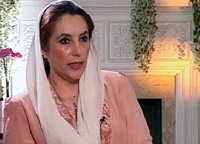Bhutto gets new threats

A top Pakistani official revealed there were two suicide attackers guilty of last week's bloody assassination. Meanwhile, Benazir Bhutto on Tuesday received a new death threat, her lawyer said.
Sen. Farooq Naik, Bhutto's lawyer, said he had received a two-page handwritten letter in the Urdu language from an unidentified person threatening to kill her "by any means." The writer claimed to be a friend of al-Qaida, Osama bin Laden and extremists in Pakistan.
The authenticity of the letter could not be confirmed, but Naik said the party was taking it seriously. He said he asked the chief justice of Pakistan to get the government to investigate the threat and protect her.
"After the Oct. 18 incident, we cannot take anything lightly," he said.
Bhutto's homecoming from an eight-year exile was shattered by a bombing Thursday that hit her caravan as she traveled through Karachi. She escaped injury, but 136 other people were killed.
Sindh provincial Gov. Ishrat Ul-Ebad Khan said people in custody in connection with seven previous suicide attacks in Karachi were being questioned in prisons in the city and elsewhere in Pakistan in the hope they can provide clues into Thursday's bombing.
Police had initially said only one suicide bomber participated in the attack, but Khan said "it was more than likely" there were two, after pieces of a second severed head were found at a hospital and at the site of the attack.
He said the state agency that oversees Pakistan's national identity cards was helping to try and identify the bombers - one of whose pictures has been made public.
Although no arrests have been made, Khan said the investigation was progressing. He rebutted earlier reports that three men had been detained in connection with a vehicle used by an attacker.
Bhutto's spokeswoman reiterated a call for the chief investigator to be replaced. She has already called for Pakistan to seek expert help from the U.S. and Britain in the probe.
"Benazir Bhutto is not satisfied with the investigation, comments made by some elements of the government blaming (Bhutto's Pakistan People's Party) are increasing her concerns," spokeswoman Sherry Rehman said.
Bhutto escaped unhurt from the bombing that targeted her heavily guarded convoy in the southern city of Karachi around midnight, about 10 hours after she returned to Pakistan from an eight-year, self-imposed exile.
Bhutto claims that streetlights had been deliberately extinguished on herroute to conceal the attacker - a claim that Khan said would be investigated although he said TV footage of the incident showed lights were on.
Bhutto also claims extremist elements in the government and the security apparatus are trying to kill her. She alleges they include remnants of the regime of former military leader Gen. Zia-ul Haq, under whose government her father Zulfiqar Ali Bhutto, who also served as prime minister, was executed for allegedly conspiring to kill a politician.
Venomous exchanges have erupted between Benazir Bhutto and the ruling party, with each accusing each other over the bombing - stretching the possibility that the two parties could form a coalition in support of President Gen. Pervez Musharraf after January parliamentary elections.
Bhutto, whose two governments between 1988-1996 were toppled amid allegations of corruption and mismanagement, has been in talks with Musharraf that led to the lifting of graft cases against her. Although longtime rivals, she and Musharraf are both moderates keen to combat the al-Qaida and the Taliban.
But Bhutto thinks ruling party chief Chaudhry Shujaat Hussain and a head of a spy agency - both close associates of Musharraf - could be behind the attack. She has given no evidence in public to back up her claim.
Hussain, in an apparently sarcastic swipe at Bhutto, said Monday that her husband, working with Bhutto and other party leaders, arranged the blasts to stir up public sympathy. The proof: Bhutto went into her armored vehicle minutes before the bombs exploded and was not hurt.
Although his tone appeared to be tongue in cheek, such accusations often gain traction in Pakistan, where conspiracy theories thrive in its violent, intrigue-filled politics.
Hussain's father was killed in 1981 - allegedly by a militant group run by one of Bhutto's late brothers.
Prime Minister Shaukat Aziz, rejecting Bhutto's request that experts from the U.S. and Britain be invited to help with the probe, expressed confidence Tuesday the attackers would be brought to justice.
In past attacks "our security agencies had successfully investigated and arrested the perpetrators and are fully capable of investigating such untoward incidents," Aziz said in a statement.
Also Tuesday, most lawyers boycotted courts and dozens of others rallied in the eastern city of Lahore, condemning the attack on Bhutto and demanding stern punishment for those who tried to kill the former premier.
Subscribe to Pravda.Ru Telegram channel, Facebook, RSS!




